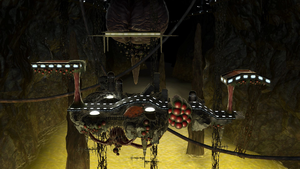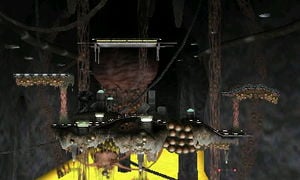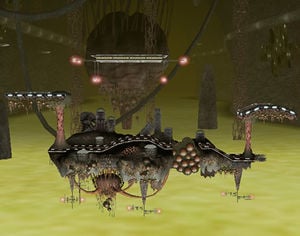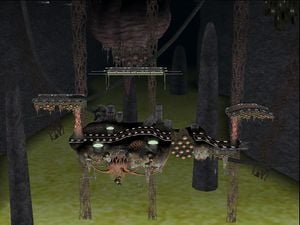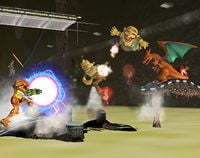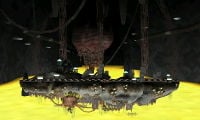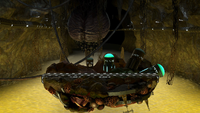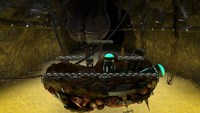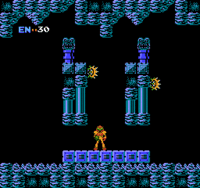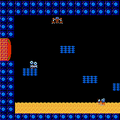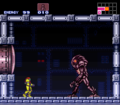Brinstar
| Metroid Planet Zebes: Brinstar | |
|---|---|
Brinstar as it appears in the Smash series. | |
| Universe | Metroid |
| Appears in | Melee Brawl SSB4 (3DS) Ultimate |
| Availability | Starter |
| Crate type | Futuristic |
| Maximum players | 4 (Melee, Brawl, and 3DS) 8 (Ultimate) |
| Article on Metroid Wiki | Brinstar |
| “ | This stage is an underground cavern on Planet Zebes, where the Metroid Series takes place. Although the rising and falling acid at the bottom of the stage can deal severe damage, touching it when you're falling off the stage can actually help you recover! | ” |
| —Super Smash Blog, Super Smash Bros. Ultimate Official Site | ||
Brinstar (ブリンスタ, Brinstar) is the default Metroid stage that appears in Super Smash Bros. Melee, Super Smash Bros. Brawl, Super Smash Bros. for Nintendo 3DS, and Super Smash Bros. Ultimate. It is a redesigned version of Planet Zebes from the original Super Smash Bros. In Ultimate, Zero Suit Samus is fought here for her unlock battle.
Stage overview[edit]
The battle takes place in an underground cavern. The stage has a similar appearance to Battlefield, consisting of a main, rocky platform, two soft platforms on the side and a hovering metallic soft platform in the center. The main platform can be passed through from below, and it actually consists of two parts held together by a fleshy blob on the right side: said blob can be weakened by attacks, and when destroyed the main platform gets separated. The same can happen to the fleshy poles which keep the main platform and the side ones together: when they are destroyed, the platforms that were being supported tilt at a very sharp angle.
The destroyable parts will start to regenerate if they are not continuously attacked, fully growing back after a while. While regenerating, the substance that holds the stage together is fall-through.
Occasionally, an earthquake occurs and, just like Planet Zebes, acid starts to rise, sometimes covering parts of the stage. The acid deals damage and moderate knockback, but will not KO until very high percents, especially in Ultimate. While it is rising it will generally prevent characters from being KO'd on the bottom blast line. It will rise and pause at various intervals, rarely reaching its highest point where it will cover everything except the topmost platform (and the tops of the side platforms if their supports are broken). After a while, the acid subsides.
In the back of the main platforms there are some ruins and a lone Chozo statue, which occasionally gets up and walks around with no gameplay effect. The background is occupied by a large pool of acid with an unidentified life form hanging above it. When the acid rises the brain-like creature may occasionally shake and even grow boils due to possible irritation from the acid.
Brinstar is considered the best Jigglypuff and Ganondorf stage in Melee (due to Rest combos with Jigglypuff and forward aerial combos with Ganon off the acid) and one of the better Mr. Game & Watch and Wario stages in Brawl (due to air camping beneath the platform).
If hazards are turned off in Ultimate, the flesh is not destructible, and the acid never rises, so players can always be KO'd at the bottom blast line no matter when.
Ω form and Battlefield form[edit]
In Super Smash Bros. for Nintendo 3DS, the Ω form consists of a completely flat and larger version of the regular form's middle platform. The acid never rises.
In Super Smash Bros. Ultimate, the Ω form and Battlefield form are set on a slightly redesigned version of SSB4's Ω form, but is resized and reshaped to match Final Destination and Battlefield, respectively. The three soft platform's designs are the same as the walkway of the main platform.
Origin[edit]
This stage is loosely based on the area Brinstar from Metroid and Super Metroid. However, its overall design is largely original to the Smash series; the only clear references include the yellow acid (featured in some rooms in Brinstar), the blocks with angry faces in the background (which originally appeared in Brinstar in Metroid, in the room where the Morph Ball is found), and the pillars at the sides of the stage (which behave similarly to the Zebetite pillars in Mother Brain's room in both games).
The acid rising up and down in this stage is similar to the acid in some rooms in Metroid II: Return of Samus that would lower upon Samus killing enough Metroids, and the acid in Mother Brain's room in Super Metroid that rose after earthquakes. A large part of Metroid's gameplay is exploration, which often involves destroying blocks with Morph Ball bombs to reveal secret passages: in particular, some blocks have a fleshy appearance similar to the one of the middle section of the stage.
In Super Metroid, Chozo Statues act as pedestals, carrying items in their hands. Some of them are able to walk, carrying Samus with them and enabling her to reach hidden areas, while others, called Torizos, are hostile and act as mini-bosses. In this stage, a Torizo is seen in the background and will occasionally walk around.
A room in Brinstar from Metroid featuring yellow acid.
Tournament legality[edit]
Brinstar used to be a counterpick stage, in both Melee and Brawl, due to the much more lax attitudes towards stage hazards and unorthodox stage designs. However, as time went on, characters such as Melee Jigglypuff and Brawl Meta Knight proved to be extremely powerful on this stage, as when the acid engulfs the main body of the stage, they can maintain extremely powerful control over the platforms with little to no risk of falling into the acid themselves. Additionally, in Melee, the ceiling glitch can cause players to be unfairly K.Oed at extremely low percents by the acid, and the much less forgiving ledge mechanics further benefited floaty characters due to the lack of walls for most recoveries to ride. Meanwhile, in Brawl, the stage would ultimately be banned due to the rapidly growing dominance of Meta Knight, and growing desires for a more conservative stagelist among regions in which the character was extremely common.
With the addition of the stage hazard toggle in Ultimate, Brinstar was initially considered for a counterpick due to the acid no longer being a factor, but its very small blast zones relative to the body of the stage cause greater volatility due to noticeably lower average K.O percents over the course of a match, and its heavily sloped surfaces can disproportionately favor short, small characters who are already difficult to attack. As a consequence, it is rarely, if ever, used in competitive play.
After a significant period of not seeing competitive play, Brinstar was made legal for Melee doubles tournament play at The Off-Season 2, as a charity incentive.
Gallery[edit]
Super Smash Bros. Melee[edit]
Super Smash Bros. Ultimate[edit]
Names in other languages[edit]
Trivia[edit]
- In Melee's debug menu, this stage is referred with the term "ZEBES". This presumably refers to the stage's similarity with Planet Zebes from Smash 64; the stage is also referred in Brawl and Ultimate within game files with the codename "metroid_zebesdx", with the term "dx" coming from Melee's Japanese name (大乱闘 スマッシュ ブラザーズ DX).
- There are several references to Mother Brain in this stage:
- The fleshy stalks that connect the platforms could reference the Zebetite barriers that Samus had to break before reaching the final boss in Metroid and Super Metroid.
- The gigantic alien organism in the far background somewhat resembles Mother Brain herself. While the organism lacks several of Mother Brain's characteristics, such as her recognizable single eye, a hacked camera reveals in profile that it is actually a giant brain complete with a spinal cord (which appears to be a "tentacle" otherwise).
- Hacked cameras also reveal that the stage is actually an extremely large tunnel which strongly resembles the one from Mother Brain's appearance in Metroid. The far back of the tunnel makes a very sharp left, presumably to form a "back" of the tunnel for the sake of the game's appearance.
- It is possible to perform the earthquake glitch here.
- In Brawl, during Training Mode the rise and fall of the acid and the regeneration of the organic parts are not affected by the player's choice of speed.
- This is the only Melee stage in SSB4 to not have a new remix.
- If Master Hand or Crazy Hand dies in Stamina mode, they will endlessly bounce off of the acid.
- In the SSB4 version of this stage, the Chozo statue doesn't move at all, and bumps do not grow out of the brain-like creature in the background.
- In Melee, when a fighter makes contact with the acid, a unique splash effect erupts from the acid with a distinct sizzling sound. This effect is absent in all future versions of the stage.
- In Ultimate, the Moon and Nikki cannot be summoned on this stage. Additionally, Giratina and Xerneas cannot be summoned from Poké Balls.
- Assist Trophies that can only appear on the Battlefield and Omega forms of this stage are Jeff, Ashley, Kapp'n, Riki, Color TV-Game 15, Devil, Dr. Wright, Yuri Kozukata, Squid Sisters and Ghosts.
- Poké Ball summons that can only appear on the Battlefield and Omega forms of this stage are Moltres, Togepi, Lugia, Kyogre, Palkia, Arceus, Kyurem and Marshadow.
- In Ultimate, the brain-like creature in the background does not shake along with the bumps like it did in Melee and Brawl. The bumps merely clip through the brain while it stays still.
- Brinstar was used for an edition of "Find the Enderman," a game Masahiro Sakurai created where he would hide the Enderman somewhere on screen for the development team to find.[1]
References[edit]
External links[edit]
| Stages in Super Smash Bros. Melee | |
|---|---|
| Starter stages | Brinstar · Corneria · Fountain of Dreams · Great Bay · Green Greens · Icicle Mountain · Jungle Japes · Kongo Jungle · Mushroom Kingdom · Mute City · Onett · Pokémon Stadium · Princess Peach's Castle · Rainbow Cruise · Temple · Venom · Yoshi's Island · Yoshi's Story |
| Unlockable stages | Battlefield · Big Blue · Brinstar Depths · Final Destination · Flat Zone · Fourside · Mushroom Kingdom II · Poké Floats |
| Dream Land · Kongo Jungle · Yoshi's Island | |
|
| |
|---|---|
| Fighters | Samus (SSB · SSBM · SSBB · SSB4 · SSBU) · Zero Suit Samus (SSBB · SSB4 · SSBU) · Ridley (SSBU) · Dark Samus (SSBU) |
| Assist Trophies | Metroid · Dark Samus · Mother Brain |
| Bosses | Ridley · Meta Ridley |
| Stages | Planet Zebes · Brinstar · Brinstar Depths · Frigate Orpheon · Norfair · Pyrosphere Brinstar Escape Shaft (Adventure Mode) |
| Item | Screw Attack · Power Suit Piece |
| Enemies | Geemer · Kihunter · Metroid · Reo · FG II-Graham · Joulion · Zero |
| Other | Gunship · Kraid |
| Trophies, Stickers and Spirits | Trophies (SSBM · SSBB · SSB4) · Stickers · Spirits |
| Music | Brawl · SSB4 · Ultimate |
| Masterpieces | Metroid · Super Metroid |
